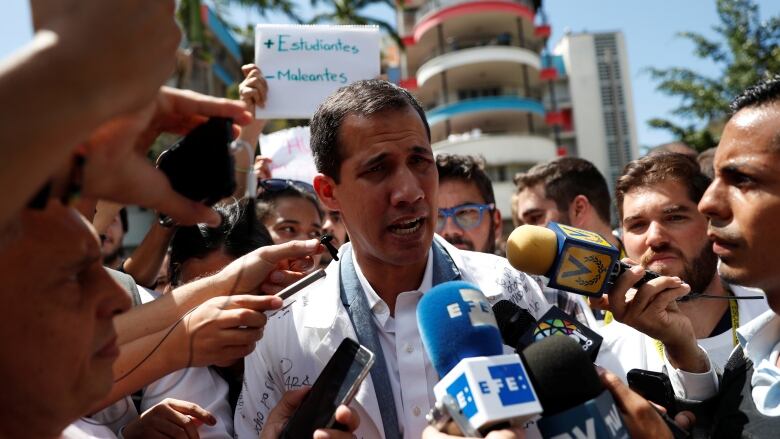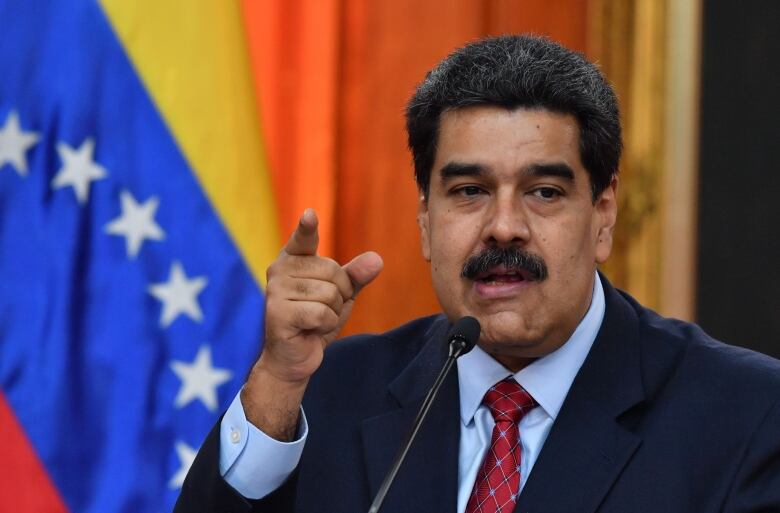Who represents Venezuela? With no clear answer, international aid stuck in limbo
Humanitarian support paralyzed due to global division over who to recognize as legitimate leader

Three daysafter proclaiming himself Venezuela's head of state, Juan Guaidowrote to the United Nations Secretary General Antonio Guterresasking for help in tackling the country's urgent humanitariancrisis.
But Venezuela's seat at the 193-member world body is held byPresident Nicolas Maduro's government and Guterres is unable toramp up a humanitarian response in Venezuela without Maduro'sapproval or UN Security Council authorization.
"The United Nations are ready to increase their activitiesin Venezuela in the areas of humanitarian assistance anddevelopment," Guterres told Guaido in a letter dated Jan. 29 andseen by Reuters on Wednesday.
"For that, the United Nationsneed, however, the consent and co-operation of the government."
The exchange illustrates how a U.S.-led campaign forinternational recognition of Guaido over Maduro has left theUN and other international organizations caught in the middleof global division over the issue.
Canadaand most Latin American and European countrieshave recognized Guaido or are on the verge of doing so. Butthese rapid endorsements have triggered angry responses fromRussia, China and a few left-leaning Latin American states.
The five permanent members of the UN Security Council, who wield veto powers over the body's decisions, include the U.S., Russia and China.
Interventions stalled
The international split is also hampering swift decisions atother multilateral groups like the Washington-headquarteredInternational Monetary Fund and the World Bank, whoserecognition of the Guaido government could eventually help getsorely needed loans to Venezuela.
Maduro's government has denied that there is a humanitariancrisis in the country, blaming economic problems on international sanctions.Venezuela is struggling with hunger, preventable diseases andhyperinflation forecast at 10 million per cent in 2019.
The quickest way for a country or countries to try anddeprive Maduro's government of Venezuela's UN seat would be topresent a draft resolution to the General Assembly for a vote.However, diplomats said that such a move could not currentlygarner the majority support needed to be successful. Each UN member state has one vote in the General Assembly.

"We do think there will be appropriate resolutions when thetime is right and we'll certainly support those. They won't comejust from us, they'll come from other nations who care deeplyabut the Venezuelan people as well," U.S. Secretary of StateMike Pompeo told reporters at the UN on Saturday.
Maduro was sworn in on Jan. 10 for a second term in officeafter elections last year that were widely dubbed illegitimate,while Guaido took the helm of the elected National Assemblyearlier this month and on Jan. 23 proclaimed himself thecountry's rightful leader.
Security Council impasse
A heated Security Council meeting on Saturday revealed thebitter divide over the crisis.
When asked about the possibility of a showdown overVenezuela's UN seat, Russian UN Ambassador Vassily Nebenziasaid Maduro's government was legitimate and there was no need tochallenge its credentials.
The UN has previously had to address competing claims forrepresentation at the world body.
In September 2011, the General Assembly approved a Libyanrequest to accredit envoys of the country's interim governmentas Tripoli's sole representatives at the world body, effectivelyrecognizing the National Transitional Council. The move cameafter the United States, Russia, China and European nations hadall recognized that council.
So far, Guaido has named envoys to Washington and theOrganization of American States regional bloc. If he decided toname a UN envoy, such a request would traditionally be sent toGuterres and then considered by a nine-member credentialscommittee, which includes the United States, Russia and China.

The IMF and World Bank could eventually test support forGuaido through a straw poll of member countries that make uptheir respective executive boards, according to several bank andfund officials. The United States is the largest and mostinfluential member country in both organizations.
Latin America's largest lender, the Inter-AmericanDevelopment Bank (IADB), could be the first financialinstitution to put the issue before its board. Such a move could occuras early asnext week, according to some officials. Several board officials,however, cautioned that the membership was divided and there wasno consensus on how to proceed.
Still, recognition by global lenders of Guaido will notautomatically unlock multilateral funding any time soon,officials said. Venezuela is $212 million US in arrears to the IADBand was censured by the IMF last year for failing to provideeconomic data to the fund.
"It is not obvious what the UN is going to do, much lesswhat the IMF would do," said James Boughton, the IMF's formerhistorian, now at the Center for International GovernanceInnovation.
"It would be up to a member country to request theacknowledgement of a new government, in this case it would comefrom the U.S.," said Boughton.
When that happens, "then it is just a question of a simplemajority decision by the executive board," citing IMF rules.












_(720p).jpg)


 OFFICIAL HD MUSIC VIDEO.jpg)
.jpg)



























































































